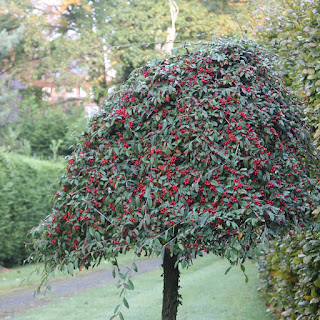Super Foods For Birds
Where have all the Birds Gone from our Garden
We can send an invitation out to the birds by planting food for them.
There are Many Plants we know of like crab apple or holly
but here are a few more that might help.
Plant in hedgerows or as ornamental plants in the school garden beds
Why not put a sign beside it with name of tree or shrub and Which birds likes to visit
•Vibiurnum Opulus
This native deciduous Shrub, Viburnum Opulus, bears heavy clusters of glossy berries from November through to March. These are loved by Thrushes and Bullfinches, in particular. It makes an excellent hedging plant too.

•Hawthorn : Paul Scarlet
The shiny clusters of haws can stay on hawthorn trees until February or March. They’re the favourite berry of blackbirds, redwings and fieldfares and are enjoyed by many other species too, including chaffinches, starlings and greenfinches. The leaves are the foodplant for caterpillars of many species of moth, providing food for baby birds in spring.
The shiny clusters of haws can stay on hawthorn trees until February or March. They’re the favourite berry of blackbirds, redwings and fieldfares and are enjoyed by many other species too, including chaffinches, starlings and greenfinches. The leaves are the foodplant for caterpillars of many species of moth, providing food for baby birds in spring.
•Ivy
In autumn, ivy flowers attract insects, which in turn provide food for robins and wrens. When the black berries appear in the middle of winter, they’re devoured by everything from thrushes, waxwings, starlings and jays, to finches and blackbirds. The leaves provide food for caterpillars of the holly blue butterfly, as well as nesting and roosting shelter for birds.
In autumn, ivy flowers attract insects, which in turn provide food for robins and wrens. When the black berries appear in the middle of winter, they’re devoured by everything from thrushes, waxwings, starlings and jays, to finches and blackbirds. The leaves provide food for caterpillars of the holly blue butterfly, as well as nesting and roosting shelter for birds.
•Holly berries
are also great natural bird food but also Listeria for
pheasants and Killarney Strawberry Tree
•Honey Suckle
As it’s a climber, honeysuckle is ideal when space is tight. In autumn it provides berries and shelter for birds such as thrushes, warblers and bullfinches. In summer, its scented flowers attract insects and so provide food for a different range of birds.
As it’s a climber, honeysuckle is ideal when space is tight. In autumn it provides berries and shelter for birds such as thrushes, warblers and bullfinches. In summer, its scented flowers attract insects and so provide food for a different range of birds.
•Cotoneaster
The branches of this shrub / tree are laden with small red berries from autumn onwards. This plant is often the first to be stripped of its bounty, as the nutritious berries are extremely popular with garden birds such as blackbirds, thrushes and waxwings.
•Pyracantha
Grown against a wall, this evergreen shrub produces white flowers in spring and an abundant supply of bright orange berries in autumn, great for attracting a whole host of bird species
Grown against a wall, this evergreen shrub produces white flowers in spring and an abundant supply of bright orange berries in autumn, great for attracting a whole host of bird species
•
•Other good
options are:Malus (crab apple), Holly, Amelanchier:
June berry, Sorbus Mountain ash, Rosehips










Comments
Post a Comment